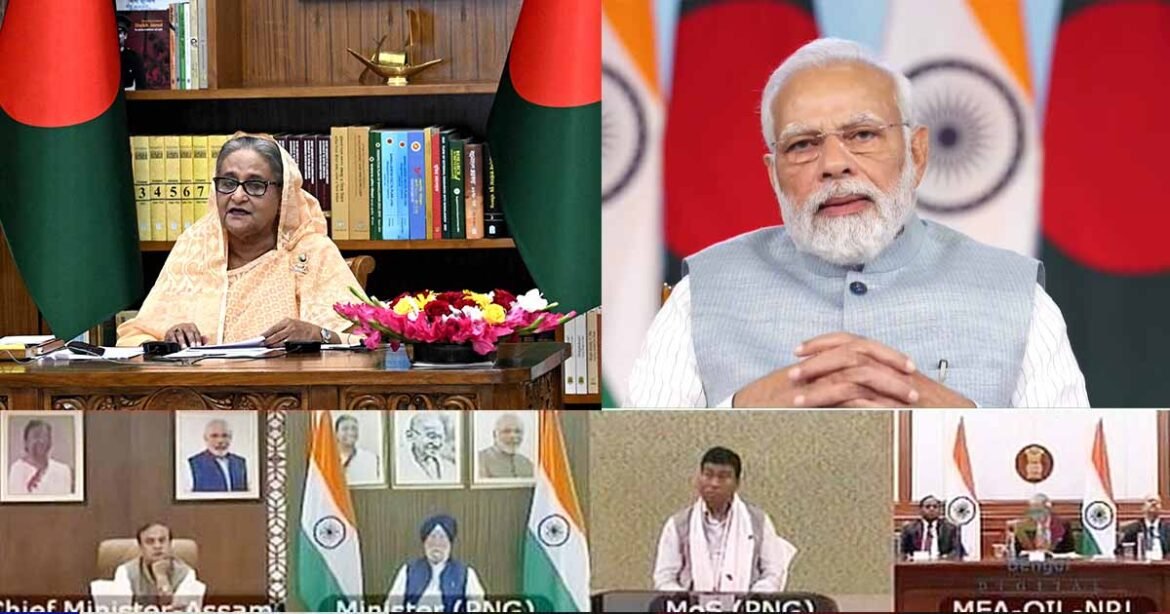On Saturday, Bangladesh’s Prime Minister Sheikh Hasina and Indian Prime Minister Narendra Modi jointly inaugurated the India-Bangladesh Friendship Pipeline, marking the first cross-border energy pipeline between the two countries. The pipeline was built at a total cost of Rs 377 crore, with the Indian government bearing the cost of the Bangladeshi portion of the pipeline, which was approximately Rs 285 crore under grant assistance.
You Can Also Read: How ‘Indo-Bangla Friendship Pipeline’ will boost the energy sector?
During the virtual event, the leaders of both countries expressed confidence that the pipeline would accelerate Bangladesh’s development and serve as an excellent example of increasing connectivity between the two countries. This pipeline is expected to strengthen the energy infrastructure and augment bilateral relations between India and Bangladesh.
This pipeline will facilitate the cost-effective and environmentally friendly transportation of diesel, which will help improve the energy security of Bangladesh.
Narendra Modi’s speech on Bangabandhu’s vision
During his speech, Modi praised Bangabandhu’s Sonar Bangla vision and called the opening of the pipeline a new chapter in the bilateral relations between India and Bangladesh.
Modi acknowledged the remarkable progress made by Bangladesh under the able leadership of Prime Minister Sheikh Hasina in the past few years. He expressed his pride in India’s contribution to Bangladesh’s development journey and emphasised the importance of cooperation between the two countries in the energy sector.
The 131.57-kilometer cross-border pipeline is expected to enhance energy security and promote trade and investment between India and Bangladesh. It will transport high-speed diesel from the Numaligarh Refinery in India’s northeastern state of Assam to Parbatipur in northern Bangladesh.
Modi also conveyed his gratitude to Bangladesh Prime Minister Sheikh Hasina for her constant guidance and support towards the pipeline project.
Importance of the pipeline in building Bangabandhu’s Sonar Bangla
The energy pipeline is expected to enhance energy security, promote trade, and facilitate economic growth in the region. This project is a significant milestone in India-Bangladesh relations, reflecting the countries’ growing partnership in various fields, including trade, connectivity, security, and people-to-people ties.
The inauguration of the pipeline was held on the birth anniversary of Bangabandhu Sheikh Mujibur Rahman, which the Indian Prime Minister, Narendra Modi, acknowledged as an auspicious coincidence. He expressed his gratitude for the visionary leadership of Bangabandhu Sheikh Mujibur Rahman, who had a dream of a prosperous and harmonious region. The “Sonar Bangla” vision of Bangabandhu was aimed at bringing together the people of the region and promoting their collective welfare. The project will also enhance energy security in the region and help reduce the carbon footprint by replacing traditional fuels with cleaner and greener natural gas.
Modi added, with reference to the physical connectivity progress of both India and Bangladesh, “Some years ago, prime minister Sheikh Hasina expressed her vision of restoring the rail connectivity of pre-1965, which I can remember clearly. After that vision, both Bangladesh and India made significant improvements in the same way. For all of these foresighted visions, I express my heartfelt gratitude to Sheikh Hasinaji.”
Modi also added, “This rail system helped both countries in the supply of oxygen from India to Bangladesh during the COVID-19 pandemic situation.” According to a statement issued by the Indian Prime Minister’s Office (PMO), Numaligarh Refinery Limited, a state-owned company in the northeastern Indian state of Assam, has been supplying petroleum products to Bangladesh since 2015. This initiative represents the second cross-border energy pipeline between India and its neighbouring countries, with the first one established with Nepal.
In the case of an energy pipeline, the India-Bangladesh Friendship Pipeline (IBFP) is the first one that connects both India and Bangladesh with a transportation capacity of high-speed diesel (HSD) up to one million tonnes per annum.


